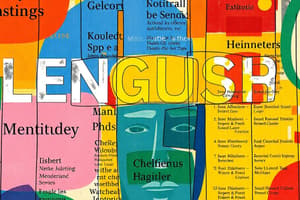Podcast
Questions and Answers
What is the primary focus of Noam Chomsky's transformational-generative linguistic analysis?
What is the primary focus of Noam Chomsky's transformational-generative linguistic analysis?
- It emphasizes the historical development of languages.
- It proposes that understanding language is innate to humans. (correct)
- It argues that language is entirely learned through social interaction.
- It focuses solely on the grammar rules of individual languages.
Which linguist is credited with laying the groundwork for structuralism in linguistics?
Which linguist is credited with laying the groundwork for structuralism in linguistics?
- Franz Boas
- Noam Chomsky
- Ferdinand de Saussure (correct)
- Edward Sapir
What aspect of language did Franz Boas and Edward Sapir focus on in their research?
What aspect of language did Franz Boas and Edward Sapir focus on in their research?
- The study of grammar in Indo-European languages.
- The characteristics of unwritten languages. (correct)
- The social implications of language in modern contexts.
- The historical analysis of written languages.
How does structuralism view the relationship between language and speech?
How does structuralism view the relationship between language and speech?
What concept did Chomsky challenge regarding language acquisition?
What concept did Chomsky challenge regarding language acquisition?
What motivated the study of language by Hindu priests approximately 2500 years ago?
What motivated the study of language by Hindu priests approximately 2500 years ago?
Which grammarian produced the earliest known description of Sanskrit rules?
Which grammarian produced the earliest known description of Sanskrit rules?
What significant change occurred in the study of language by the end of the 18th century?
What significant change occurred in the study of language by the end of the 18th century?
Which field emerged in the late 18th century due to the observation of correspondences among Sanskrit, Latin, and Greek?
Which field emerged in the late 18th century due to the observation of correspondences among Sanskrit, Latin, and Greek?
Which primary focus characterized the work of European linguists in the 19th century?
Which primary focus characterized the work of European linguists in the 19th century?
Flashcards
Origins of Language Study
Origins of Language Study
Ancient Greek philosophers and Indian priests began analyzing language, grammar, and its evolution thousands of years ago.
Panini's work
Panini's work
Panini, a 400 BC Indian grammarian, created the earliest description of Sanskrit grammar rules.
Roman Language Studies
Roman Language Studies
Roman grammarians, like Cicero, Donatus, and Priscian, built on Greek models and created detailed Latin grammar systems used for centuries.
18th Century Language Study
18th Century Language Study
Signup and view all the flashcards
Indo-European Linguistics
Indo-European Linguistics
Signup and view all the flashcards
Transformational-generative grammar
Transformational-generative grammar
Signup and view all the flashcards
Chomsky's view on language
Chomsky's view on language
Signup and view all the flashcards
Descriptive linguistics
Descriptive linguistics
Signup and view all the flashcards
Structuralism in Linguistics
Structuralism in Linguistics
Signup and view all the flashcards
Ferdinand de Saussure's Contribution
Ferdinand de Saussure's Contribution
Signup and view all the flashcards
Study Notes
History of Linguistics
- Speculation about language dates back thousands of years, with ancient Greek philosophers discussing language origins, grammar rules, and word classification.
- By the 3rd century BC, Greeks had categorized words into parts of speech.
- In India, religious motivations drove language study. Hindu priests noticed language changes since the Vedas (sacred texts), compiled around 1000 BCE.
- Panini, an Indian grammarian (c.400 BCE), produced the earliest Sanskrit grammar.
- Romans adopted Greek grammatical models, creating Latin grammars. Cicero (1st century BCE) and later Roman grammarians, like Donatus and Priscian, wrote extensively about rhetoric and Latin grammar. Roman works served as language study standards for over 1000 years.
- In the 17th and 18th centuries, modern languages (French, English) replaced Latin, leading to wider language studies. Improvements in printing brought more language texts into circulation.
- Phonetics (the study of sounds) gained importance, leading to comparisons across languages and laying groundwork for Indo-European linguistics.
- 18th century observation of similarities between Sanskrit, Latin, and Greek led to the field of Indo-European linguistics.
- 19th century saw an emphasis on philology (historical language analysis) to explore language evolution and relationships.
20th Century Linguistics
- Early 20th century: Language studies expanded to include previously unwritten languages, particularly Native American languages.
- Anthropologists like Boas and Saussure developed descriptive linguistics techniques for studying unwritten languages.
- Structuralism, a language theory: Language is a structured system, building on the work of Ferdinand de Saussure, who distinguished between spoken language and the shared understanding of grammatical rules underlying it.
- Structuralism emphasizes the relationships between speech elements within a system.
- Noam Chomsky's transformational-generative grammar revolutionized linguistics. Grammar is viewed as a system of universal rules that are innate to all humans.
- Chomsky proposed that language is a mental capacity (language competence), distinct from the use of language (language performance);
- Chomsky emphasized universal grammar (shared by all languages) and language acquisition as innate.
Recent Developments
- 20th-century linguistic theory focused more on grammar's underlying systems ("grammar" as a mental process) rather than recorded examples.
- Linguistic approaches incorporate universals, historical/comparative analysis, and language acquisition processes.
- Modern linguistics includes psycholinguistics (how people acquire and use language), sociolinguistics (how social factors influence language), and the study of animal communication.
Studying That Suits You
Use AI to generate personalized quizzes and flashcards to suit your learning preferences.




